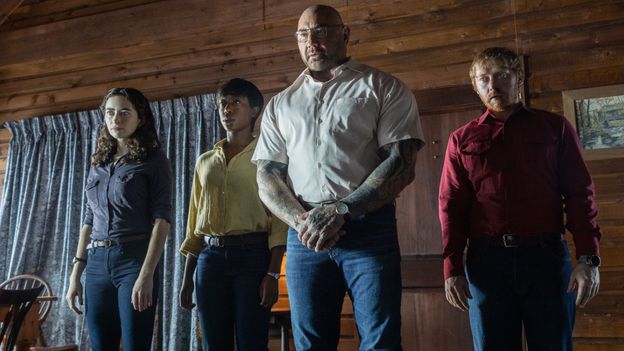
Adapted from The Cabin at the End of the World, a novel by Paul Tremblay, Knock at the Cabin sees Shyamalan returning to the apocalyptic concerns of two of his earlier films, Signs and The Happening. They’re timely concerns, considering how anxious so many of us are about pandemics, wars and the climate crisis. And the question of what you might sacrifice for the sake of the planet is a fascinating one. But Knock at the Cabin ends up being no more than a passably tense, low-budget chamber piece that doesn’t do justice to its Old Testament conceit.
The problem is that almost everything worth knowing about the film is in the trailer – and indeed in the plot summary in this review. Shyamalan establishes within half an hour that there are only two likely ways for the story to go: either the strangers are lying, and the business about the apocalypse is nonsense, or else they’re not lying, and a sacrifice really is necessary to save humanity. What that means is that the viewer spends most of the running time sitting and waiting to learn which answer is the right one (and anyone who’s seen the trailer will have a pretty shrewd idea). The Shyamalan who made The Sixth Sense, Unbreakable and The Village 20-odd years ago might have blindsided us with a further twist which flipped our understanding of the whole situation. But in this film, as in his last one, Old, he puts all of his energy into setting up an intriguing premise, and none into moving on from that premise and into unexpected places.
He and his co-writers, Steve Desmond and Michael Sherman, allude to a couple of interesting issues, such as the homophobia of the religious right, and the 21st-Century phenomenon of people making online contact with others who share their outlandish beliefs. But the screenplay doesn’t give any of these issues more than a passing mention, nor does it comment seriously on the existential threats that face us in the real world. It feels as if the filmmakers are workshopping various different themes, without ever committing to any of them.
They don’t commit to terrifying us, either. Bautista proves, once again, to be a sensitive dramatic actor, rather than a wall of muscle, but Leonard and his crew are too relaxed to convince us of the urgency of their mind-boggling ultimatum. They don’t seem crazed enough to be telling the truth about the apocalypse – and they don’t seem crazed enough to be faking it. In fact, almost nothing in the film seems real. Stuck with one-dimensional characters and functional dialogue, the hostage-takers and their hostages sound more like school debate teams than desperate people trying to save their lives and / or the human race.